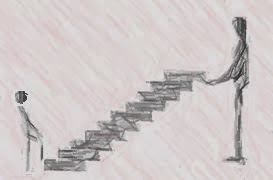Addiction is tricky. It’s in our brain. It’s in our muscles.
It gets tangled up in every aspect of our life, so that when we try to quit, the
negative habit is triggered by other, healthy pieces of our life that we do not
want to lose.
There is a tendency in our culture to use clinical services of
counseling and medicating for addiction; an individual’s solution to the individual’s
problem. But a popular intervention has been the twelve-step program.
The steps provide people with a course of action (which we all feel we need
from somewhere outside ourselves), as well as a built in support network, or ‘fellowship’.
The steps differ based on the culture of the addiction or
compulsion. Narcotics. Sex. Gambling. Work. But very generally, people are
asked to admit that they cannot control their addiction, see strength in some
higher power, reflect on their life with a sponsor, make amends for their
errors, develop a new code of behavior and learn to live it, and then to help
others through the same path.
Consuming is an addiction, but a culturally sanctioned
addiction. Other addictions, like alcoholism or sex, may be glorified in our
culture, but they also come with negative moral connotations. Consuming,
on the other hand, is considered responsible. Necessarily. How do you declare
yourself addicted to something as assumed as breathing? But we’ve been paying
to live on oxygen tanks while we go indoors to escape the wind.
Twelve steps:
1.
Admit we are disempowered by the compulsion to
consume—that our lives have become unmanageable.
2.
Believe in a restorative power greater than
ourselves as individuals.
3.
Decide to turn our lives over to the care of this
Earth and Her Spirit and a family of life.
4.
Make a searching and fearless moral inventory of
ourselves.
5.
Admit to the Spirit of this world, to ourselves,
and to another human being the exact nature of our over consumption.
6.
Be entirely ready to have the sufficiency of
this world end our addictive behavior.
7.
Reach within and beyond ourselves to overcome
limitations.
8.
Consider all in the family of life we have harmed,
and become willing to make amends to them all.
9.
Make direct amends wherever possible, except when
to do so would injure them or others.
10.
Continue to take personal inventory, and when we
are consuming beyond the design, promptly admit it.
11.
Meditate to improve our conscious contact with the
Spirit of this world and the entire family of life, praying only for a better
understanding of our relationships and the power to carry out our role in
sustaining one another.
12.
Carry this message to other consumers, and practice
these principles in all our affairs.
Hello.
My name is Renee, and I’m a consumer.
I don’t know
how else to live.
I trust there is a Way.
I commit to exploring my behavior and
its impact on all in the family of life.



